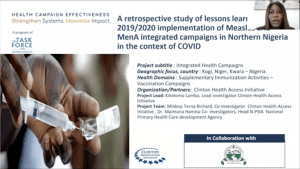On Wednesday, 1 September, two of the Health Campaign Effectiveness Coalition’s research teams presented on lessons learned on collaborative planning of health campaigns in Nigeria.
 View the recording from the presentation, slides from the first team here, and slides from the second team here.
View the recording from the presentation, slides from the first team here, and slides from the second team here.
The first presentation team was Ibolda Health International, who supported the facilitation and documentation of the collaborative planning phase of campaign integration for seasonal malaria chemoprevention (SMC) and distribution of insecticide treated nets (ITNs) in Nigeria’s Gombe and Jigawa states. During the project, the team collaborated with the National Malaria Elimination Programme and associated sub-committees.
Ibolda conducted 91 key informant interviews (KIIs) for the project, and found that integration is possible and can be seamlessly implemented. Integrating can bring about a higher demand for ITN and SMC, but requires at least a 12 month planning period to be successfully implemented. Promising practices identified by the project include early engagement of stakeholders and use of technology by sharing digital assets and data. Ibolda also highlighted several key approaches for engaging stakeholders, including joint meetings, costing calls, and shared and assigned responsibilities.
The next presentation team was the Clinton Health Access Initiative (CHAI), who conducted a retrospective study of lessons learned from the 2019/2020 implementation of integrated measles and meningitis A campaigns in the context of COVID in Nigeria’s Kogi, Niger and Kwara States. The team’s Kikelomo Lambo shared that CHAI also conducted KIIs, along with a “desk review” of multiple existing tools. The project faced challenges, which included conflicts with COVID-19 campaigns and ethical approval programs, which took much longer than anticipated.
“A key step for us was establishing the Technical Working Group,” said Ms. Lambo, “which created a platform for all stakeholders in the campaign.”
Several important steps were found, including the identification of all technical requirements early on and good data management. Promising practices included early budgeting and funds release, as well as the use of cost-effective digital tools.
Another critical practice was that of planning, which was identified as the most important step in the process.
“Planning, planning, planning all over again,” said Ms. Lambo. “You cannot overplan, you can only underplan. You have to be able to identify what the needs are, what the targets are. That is really critical.”
Other promising practices that campaign managers can take forward include the joint planning of all tools and guidelines, and ensuring integration does not add more to healthcare workers’ load through integrating tools.
The Health Campaign Effectiveness Coalition would like to thank the presenters and moderator for their time. Watch the recording of the presentation here.
Future events, including upcoming research presentations, will be announced on the Health Campaign Effectiveness Coalition website, in its newsletter, and on its social channels.
